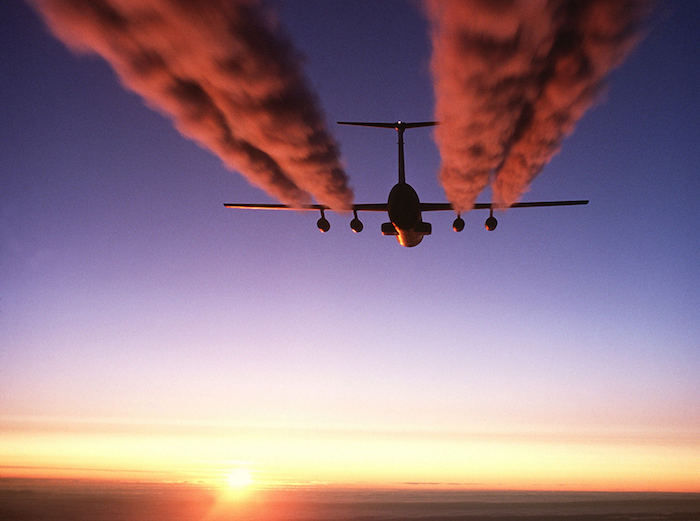In July, Solar Impulse 2 became the first airplane to fly around the world without using fuel. At the same time, the U.S. National Aeronautics and Space Administration has been working on electric planes. These developments mean air travel and transport could become more environmentally friendly, with less pollution and fewer greenhouse gas emissions, and planes would be quieter.
As promising as solar and electric planes may be, these technologies still have a way to go and won’t likely usher in a new era of airline travel soon. That’s unfortunate, because aircraft are major sources of pollution and climate-altering greenhouse gases, contributing the same amount of emissions as Germany, about two per cent of the global total. As air transport becomes increasingly popular, experts project aircraft emissions could triple by 2050.
Analysis by U.K.-based Carbon Brief found that, under business as usual, a growing commercial aviation industry could contribute 27 per cent of allowable emissions between 2015 and 2050 if the world is to meet the 2015 Paris Agreement’s aspirational 1.5 degrees celcius target for global average temperature increase — and that other factors, such as nitrogen oxide and water vapour emissions and contrails, could exacerbate climate impacts.
Air travel is also an area where there’s a huge discrepancy between those who benefit and those who suffer. The wealthiest three to five per cent of the world’s population are the biggest users of international aviation, while the impacts of climate change fall disproportionately on the world’s poorest.
Despite their emissions, airplanes haven’t been included in climate change accords like the Paris Agreement. That’s changing: a new deal to impose limits on aircraft emissions will be considered for approval at the UN International Civil Aviation Organization (ICAO) assembly in Montreal from September 27 to October 7. Many fear the proposed agreement doesn’t go far enough.
Earlier this year, ICAO’s technical committee agreed on efficiency standards for new aircraft. Although improving each new plane’s efficiency will help slow growth in aviation’s carbon pollution, the numbers of new planes taking to the skies means overall emissions will skyrocket without other measures. In 2013, ICAO committed to agree, by the time of the upcoming 2016 assembly, on a market-based measure to keep net emissions from international flights from rising above 2020 levels.
This pledge means all but the least emitting countries would require their airlines to stabilize emissions at 2020 levels. Airlines that exceed the cap would have to buy offsetting emission reductions from companies that cut their carbon pollution below it. That framework is on the table for the assembly, but it’s been watered down significantly. Any country can opt in or out of the system until 2027, and targets until then are voluntary. That creates uncertainty over whether countries like China will join.
If ICAO’s 191 member nations fail to reach a strong aviation agreement in Montreal, it could undermine the world’s ability to meet the Paris Agreement’s climate goals. In the absence of a robust international agreement on aviation carbon pollution, ICAO member nations would be left to implement their own policies, which could result in an ineffective, piecemeal approach.
The non-profit civil society member organizations of the International Coalition for Sustainable Aviation are urging ICAO to enact a “climate deal which meets the 2020 goal, has the widest possible participation, has environmental and social safeguards for the offsets and alternative fuel used and increases ambition in line with the requirements of the Paris Agreement.”
Although the greater stability international agreements would provide over scattered domestic policies and regulations means the aviation industry is mostly on-board, governments have been reluctant to sign on to strong measures.
It’s time for industry and governments to take much-needed steps to bring this major emissions source under control, especially as air traffic continues to increase. We can hope that new technologies such as solar-powered and electric planes will develop quickly enough to make a difference, and we can try to limit our personal use of air travel, and buy high-quality carbon offsets when we do fly, but international agreements are crucial.
Let’s urge government representatives to come up with a strong, enforceable agreement that helps meet the Paris Agreement objectives. If that speeds up development of planes that produce no emissions or far fewer than current aircraft, even better.
Written with contributions from David Suzuki Foundation Senior Editor Ian Hanington.
Learn more at www.davidsuzuki.org.
Like this article? rabble is reader-supported journalism. Chip in to keep stories like these coming.



